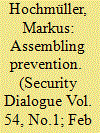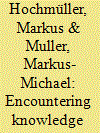| Srl | Item |
| 1 |
ID:
189466


|
|
|
|
|
| Summary/Abstract |
This article examines the technopolitics of prevention in postwar Guatemala. In the 2010s, experts and policymakers shifted security governance in Central America’s most populous country towards anticipation. Against the background of rising gang violence, they implemented a set of sociopolitical and techno-material measures – based on the latest crime-control technologies, new policing strategies and urban design methods – in Guatemala’s most violent municipalities. The stated goals were to reconstruct state sovereignty and to improve public security by strengthening community resilience and inducing positive behavioural change in ‘at-risk’ citizens. Zooming in on the case of Villa Nueva, the article examines the emergence and effects of Guatemala’s ‘prevention assemblage’. It demonstrates that this technopolitical project has failed, as prevention turned into a new layer of control that shifted responsibility to local communities, further securitized urban spaces and populations, and reproduced exclusionary and repressive security governance.
|
|
|
|
|
|
|
|
|
|
|
|
|
|
|
|
| 2 |
ID:
133264


|
|
|
|
|
| Publication |
2014.
|
| Summary/Abstract |
After nearly seven years of ever-escalating violence related to the Mexican 'war on drugs', in 2013 Mexico entered the International Crisis Group's (icg) 'observatory' of countries facing a violent crisis. In this article we critically interrogate this 'Mexican turn' of the icg, as well as its accompanying forms of crisis knowledge production. By applying analytical insights from critical policy analysis and postcolonial security studies, we highlight the Western-centrism embedded in the icg's perspective on Mexico's security crisis. In analysing this perspective on questions of drug trafficking, statehood and indigenous justice, we demonstrate how this Western-centrism produces a de-politicising and overly technocratic crisis narrative. The article concludes that, through its Western-centric 'Mexican turn', the icg has been able to reaffirm its standing as a uniquely influential and internationally recognised crisis expert by showcasing its awareness of newly emerging crisis situations, as well as its possession of the necessary crisis-solving expertise.
|
|
|
|
|
|
|
|
|
|
|
|
|
|
|
|